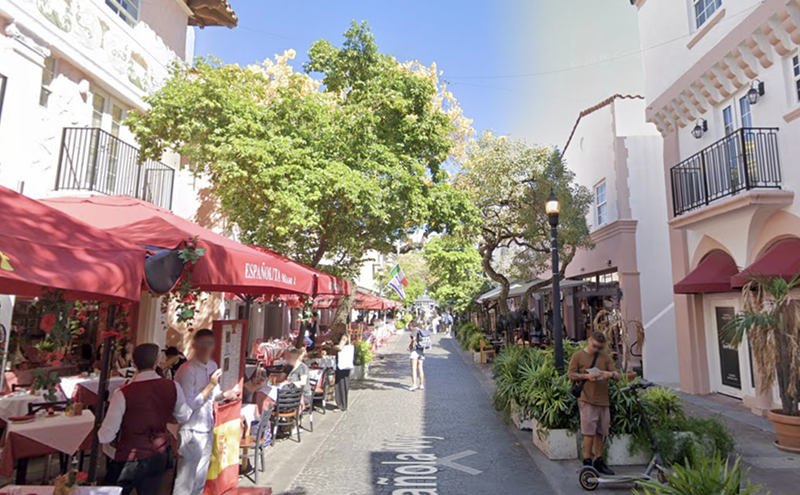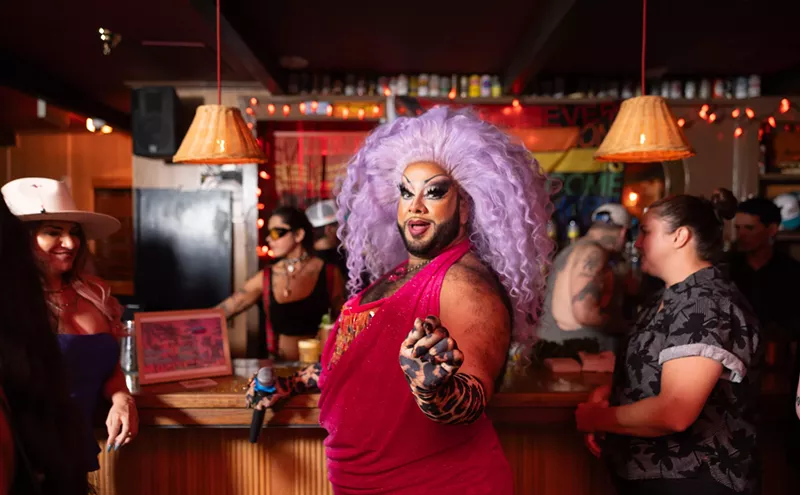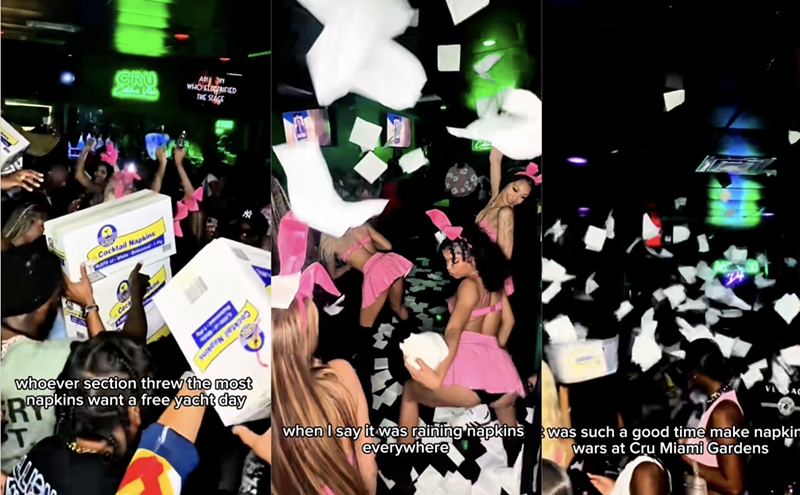Ellen Davis, a retired faculty member of the New World School of the Arts, expertly directs the show; as producer, she put up her own money to pay the ten-member cast and rent the 85-seat black box theater. The result is a moving show that shames the region's more established theaters, which have failed to present Wilson's award-winning works, including Fences (a Pulitzer and a Tony), The Piano Lesson (another Pulitzer, at Miami-Dade Community College North Campus's William and Joan Lehman Theatre through Saturday) and, of course, Ma Rainey's Black Bottom (a New York Drama Critics Circle Award).
While other theaters regularly reach out -- and often pander -- to South Florida's diverse audiences by producing plays about Hispanics, Jews, gays, and the elderly, they rarely explore the black experience. Some complain that it's too tough to find enough talented actors to fill a cast, yet almost every year several local black actors are nominated for and/or awarded Carbonell Theater Awards for outstanding performances. Others argue that, in a mostly white market, black-oriented productions are box office poison. Tell that to the black touring companies that come through town and do quite well. The fact is, a good play, no matter what its racial context, touches just about everyone.
August Wilson's plays are exceptional. Produced in regional theaters across the country, his six major works (Joe Turner's Come and Gone, Two Trains Running, and Seven Guitars round out the repertoire) are each set in a different decade and feature characters searching for a sense of self while participating in the black race's struggle for recognition and identity.
In Ma Rainey's Black Bottom, the setting is a Chicago recording studio in 1927. Ma Rainey is due any minute to kick off a recording session. The real-life Gertrude Pridgett Rainey started out in vaudeville-style song-and-dance acts, for which her stage name was either "Ma" or "Madame" Rainey. She was one of the first entertainers to use the blues in her act; as the genre caught on, she became popular. Between 1923 and 1928 she recorded 92 songs for Chicago's Paramount label.
Rainey was quite a character. A flashy dresser, she had a big heart but a volcanic temper. She was also bisexual, and rumors linked her to protege Bessie Smith, with whom she toured on the blues circuit.
While Rainey serves as inspiration, the play is completely fictional. The details, however, are authentic. Set designer Michael McKeever's run-down studio, for example, is split into two areas clearly delineated by Dale Ripingill's fade-up and fade-out lighting design: a recording room and a band rehearsal room. The hardback chairs, scarred pianos, and bare floors peg the owners as people concerned more with the artists' moneymaking potential than their comfort. Like most black musicians at the time, Rainey was paid a flat fee for recording sessions but no royalties -- even though she wrote more than a third of the songs.
Against the back wall is a control booth occupied by two white people who are obviously in control of the session, the black musicians, and the profits. Warning Rainey's manger Miss Irvin (Donna Wood) that he won't put up with any more of the singer's "Royal Highness Queen of the Blues bullshit," studio owner Sturdyvant (Ablan Roblin) reluctantly agrees to record four more songs, hoping they'll sell better than her last releases; swing is beating the blues on the charts. Sturdyvant and Irvin take advantage of Rainey's tardiness by changing the proposed song list and adding an upbeat introduction to the tune "Ma Rainey's Black Bottom."
Wilson concentrates on the four musicians in Rainey's group as they wait for her to arrive. Switching from playful jive to painful tales of discrimination, their banter is the backbone of Ma Rainey's Black Bottom, and the actors play the script's tonal changes like a tight four-piece band.
Early on, Cutler (Wayne Thompson), the guitarist, shares a joint and trades stories with Slow Drag (Roland Baker), the bass player. They talk of women, big dreams, and about whether anyone they know has actually sold his or her soul to the Devil.
Talk of the Devil eventually leads to thoughts about how to get ahead in a white man's world. Polishing his horn, Levee (Kevin Springs) thinks he has the answer: the intro to "Ma Rainey's Black Bottom," which he wrote and hopes will lead to future business with Sturdyvant. Ambitious though he is, Levee is also bitter; at one point he spits out a harrowing tale of how white thugs destroyed his family when he was a child. His revenge will be to become a successful band leader.
His hopes are ridiculed by the piano player Toledo (Skye Williams), who insists that the future of the race inheres in its African heritage. Ties to family and community are the answer, he says, not conquering white America.
Williams appropriately plays Toledo with a quiet reserve. Portraying Toledo's philosophical opposite, Springs skillfully invests Levee with both an infectious optimism and a simmering rage that boils over in the drama's explosive climax. As Toledo and Levee argue over justice, Cutler (movingly portrayed by Thompson) puts his faith in the next world. Baker's Slow Drag, meanwhile, just affably tries to get along.
All this talk about finding one's place in the world really makes no difference to Ma Rainey (Charlette Seward), because she considers herself the center of the universe. When she finally arrives, she bursts into the studio with a white policeman (Albert Acevedo) on her tail. It seems she's just been involved in a fender-bender and he's looking for a bribe to let her off the hook. But Rainey is too busy throwing her weight around, demanding more heat in the studio and a return to the original opening of her song. In fact, she demands that the old introduction, a speaking part, be delivered by her stuttering nephew Sylvester (humorously played by Gerald Pizzaro).
While dominating the stage as the forceful Rainey, Seward also evokes the underdog in the singer, who has to fight for respect. Alone with Cutler, Rainey points out that she's been invited to her manager's house only once, when Irvin needed her to sing for a group of white friends. The only place she has any power, she explains, is the recording studio. Once a record has been cut, the white folks move in and take everything. So until then, Rainey plans to ride roughshod over everyone, including her new main squeeze, a gold-digging white woman named Dussie Mae (Tanya Bravo).
Bravo plays Dussie Mae with a greedy glee that spells trouble as she flirts with Levee, telling him that all she needs to be won over are lots of gifts. Levee's relationship with the woman, and his failed negotiations with Sturdyvant, are what lead him, in the play's finale, to lash out.
Keeping the focus squarely on the characters, Davis deftly mixes the play's subplots and comes up with an enlightening slice-of-life production. Helping her is the strongest ensemble cast of the season; the supporting actors offer portrayals so well-rounded that the black characters stay off the soapbox and the white characters avoid twirling their villainous mustaches.
While it's set in a recording studio, Ma Rainey's Black Bottom doesn't offer much music. When Seward and cast do perform, they're backed up by a tape recording. But the dialogue, filled with colorful stories and seductive rhythms, is music enough. And the music, of course, is the blues. Ma Rainey, in the play's second of two acts, says, "Blues is life's way of talking to you."
Of course, the only way that Wilson can "talk" to audiences in South Florida is if his work is produced here. Given the recent shutterings or extended hiatuses of the area's few black theater troupes (Miami's M Ensemble Company, West Palm Beach's Quest Theatre, and Fort Lauderdale's Vinnette Carroll Repertory Company), other regional houses have the responsibility to make room for black plays. August should come more than once a year.
Ma Rainey's Black Bottom.
Written by August Wilson; directed by Ellen Davis; with Wayne Thompson, Skye Williams, Roland Baker, Kevin Springs, and Charlette Seward. Through March 1. The Little Stage, 2100 Washington Ave, Miami Beach; 254-8502.












